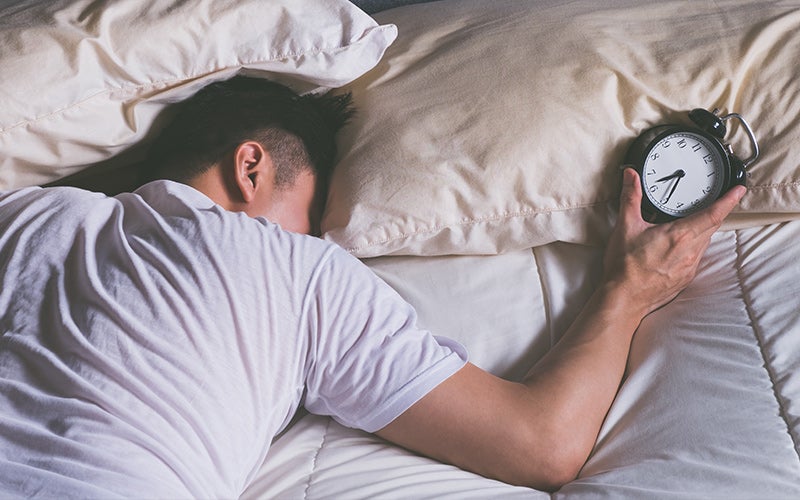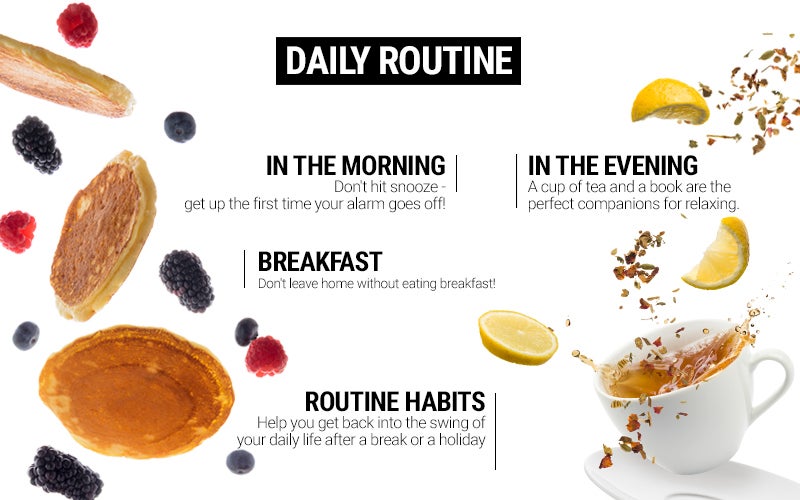From start to finish: get your daily routine started now!
 ©MundusImages
©MundusImages
Anxious, overextended, or aimless – uncertain situations can cause emotional chaos. Feeling overwhelmed sometimes is natural, but a healthy daily routine may help you bring more structure back into your life. And it’ll lead to more self-discipline, time, and a clearer head!
What is a Routine?
Whether you check your phone first thing in the morning or start the day with 5 minutes of meditation, everyone has them. And they’re not necessarily bad or good! They’re just actions that can become habits if performed repeatedly. Some examples include fixed morning schedules, and making and following a to-do list.
A daily routine helps you stay focused, and much like making a schedule, it keeps you from having to make snap decisions in the moment. The more decisions you have to make in one day, the sloppier your decisions get over the course of the day. This is due to a phenomenon called decision fatigue, which decreases your self-control with every extra choice you make1.
For example, if you’ve made it a habit to always finish your work-from-home day with a home workout, you don’t have to worry about deciding between exercise or the couch after work.
These consistent habits minimize your stress by decreasing decision-making, leaving less room for choices based on impulse. They also create more space for structure in new situations, i.e. after a vacation or injury.

Habit Scorecard – Recognize your routines
You can only change your bad habits when you’re fully aware of what they are. Every day we do things that are not good for us without even realizing it. The Habit Scorecard helps you develop a better awareness of your habits. Knowing your routines makes it easier to identify what triggers them, which helps you crush your bad habits for good.
How does the Habit Scorecard work?
Write down all the routines that you notice over the course of your day. Do you always make your bed immediately after getting up? Do you write a line in your gratitude journal before going to bed? Write down each of your routines and track them for a month.
Mark good and bad routines in different colors. How can you distinguish good routines from bad routines? Ask yourself whether the action brings you closer to your goal or not.
Download our free Habit Scorecard to develop a better awareness of your habits.
Productive morning routine
Don’t leave home without breakfast! In the morning we’re usually in a rush, so there’s often no time for breakfast. But our brains can only perform at their peak if they have enough energy. No, a snack from the coffee shop on the corner every day doesn’t count. Why not prepare your breakfast the night before? Fill a bowl with muesli and put your spoon next to it. All that’s left for the morning is to add milk! That way it’ll take only a few minutes to start your day with a good foundation.
Tip: No time for coffee in the morning? Our energy bar is as strong as a double espresso, but with guarana instead, so it’s a practical boost for your energy levels when you’re on the go.
Get up after your first alarm, drink a glass of water, and take a cold shower!
The alarm clock rings. And rings. Soon it’s been 20 minutes. 30 minutes. Finally, we give up and roll out of bed. But pressing the snooze button endlessly doesn’t mean more restful sleep. On the contrary, it makes you even more tired, both when you wake up and throughout the day.
Make sure you have a glass of water after you get up, because the last time you had anything to drink was about 8 hours ago. And then it’s off to the shower! A cold shower of 5-10 minutes stimulates your blood circulation and then you’re wide awake.

Click here for more on creating a productive morning routine that’s right for you.
Restful evening routine
A cup of tea and a book help you relax at the end of the day as part of an evening routine. Even though we could sleep for hours in the morning, it’s sometimes difficult to fall asleep in the evening. When you’re wide awake thinking about something like the film you just watched, it’s hard to get any rest. Try to read for 5-10 minutes before you go to bed and make a cup of tea. When you’re lying in bed and your thoughts are racing, concentrate on your breathing. After a few long and deep breaths you’ll relax and be off to dreamland.
Get Ready! – 7 Days to Your New Routine
Set your daily routine and get more out of your week!
Follow a daily routine for the next 7 days (or at least Mon-Fri). To make it easier to get started, we’ve got the perfect plan for you.
| Morning Routine |
|
| Throughout the Day |
|
| Evening Routine |
|
Healthy routine: All-in-One Graphic
Save time, increase your productivity, and live more efficiently. Find out more in our handy graphic:

Sources for this article
We at foodspring use only high-quality sources, including peer-reviewed studies, to support the facts within our articles. Read our editorial policy to learn more about how we fact-check and keep our content accurate, reliable, and trustworthy.
- 1 New York Times (accessed 15.05.2020) https://www.nytimes.com/2011/08/21/magazine/do-you-suffer-from-decision-fatigue.html

































